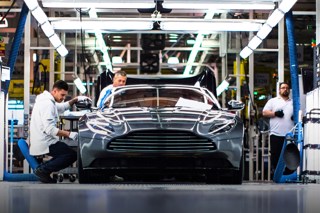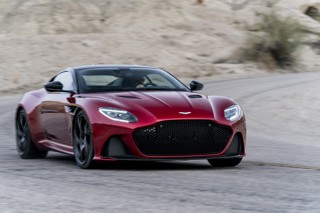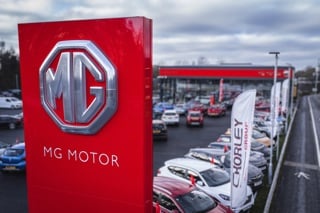Record profits have prompted Aston Martin to announce its plans to float on the London Stock Exchange later this year.
The Gaydon-based luxury sports car maker is expected to be valued at £5 billion at the IPO, the Financial Times reported, with at least 25% of its shares expected to float in the offer, which follows seven consecutive quarters of profitability.
Aston’s current backers, Italian group Invest Industrial and the Kuwaiti investment fund Investment Dar, sell down some of its shares as part of the listing.
Daimler, which owns 4.9% of Aston and has a technology sharing agreement with the company, will remain a shareholder.
“This is a monumental moment,” chief executive Andy Palmer told the FT. “When I started in 1979 there were lots of British car companies. Over the course of my career those have disappeared. Car making in the UK is in a healthy state, but companies are foreign owned. Now we will have an independent British car company again.”
 In May, the FT reported that pre-tax profits at Aston Martin had halved during the period between January and March as the company increased spending on new models and suffered unfavourable currency shifts in an expected cooler quarter.
In May, the FT reported that pre-tax profits at Aston Martin had halved during the period between January and March as the company increased spending on new models and suffered unfavourable currency shifts in an expected cooler quarter.
Pre-tax profits for the period totalled £2.8m, compared with £5.5m a year earlier.
However, this week the company said that its revenues had climbed by 14% to £449.9m in the opening months of this year, while pre-tax profits rose from £20.1m to £20.8m.
Once the cost of preference shares and other measures were stripped out, pre-tax profits rose to £42m, and the company booked a profit margin of 24 per cent, the FT said.
It said that the performance boost had come as a result of the launch of three new sports cars and growing demand in Asia.
This year Aston Martin has seen the successful launch of its new Vantage, the unveil of its DBS Superleggera and the announcement that it would recreate its iconic DB5, with 25 new versions of the car available for £2.75 million.
Last month the car maker also announced that it had completed the second phase of its new car assembly plant at St Athan, in South Wales, where production of its new SUV model is expected to get underway next year.
 In a statement issued at the time, Aston Martin said that the St Athan plant was a demonstration of Aston Martin’s continued commitment to the UK and would bring up to 750 jobs to the South Wales region.
In a statement issued at the time, Aston Martin said that the St Athan plant was a demonstration of Aston Martin’s continued commitment to the UK and would bring up to 750 jobs to the South Wales region.
Of the total workforce, 150 employees have been recruited as part of the pre-production preparations.
Aston Martin expects to sell 6,200 to 6,400 vehicles globally this year, climbing to 7,100 to 7,300 next year and up to 9,800 in 2020 when the St Athan facility begins production of the DBX SUV.
In the long run, the business expects to make up to 14,000 cars a year.



















Login to comment
Comments
No comments have been made yet.